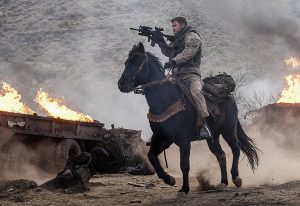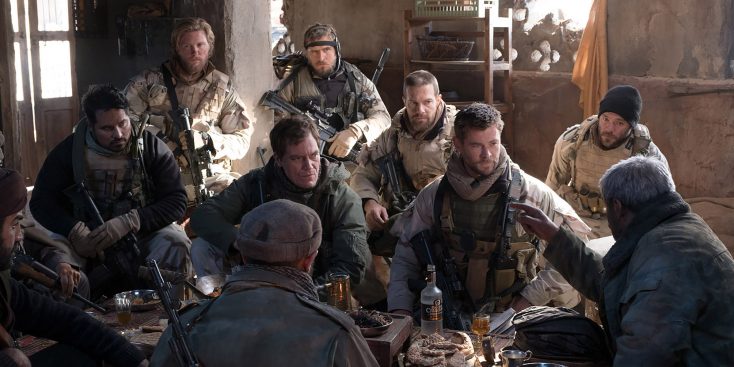
Chris Hemsworth stars as Captain Nelson in Jerry Bruckheimer Films’, Black Label Media’s and Alcon Entertainment’s war drama 12 STRONG. ©Warner Bros. Entertainment. CR: David James.
By ANGELA DAWSON
Front Row Features
HOLLYWOOD—Moviegoers know Chris Hemsworth for his depiction of Marvel’s godly superhero Thor. But the Australian actor trades his hammer for an M4 assault rifle as a U.S. Army Special Forces captain in the action-packed war drama “12 Strong.”
Hemsworth says it was a welcome change of pace portraying a real-life flesh-and-blood hero.
“I’ve done a lot of stuff in the comic book world and played fantasy heroes and it’s been a lot of fun, but I desperately wanted to do something with some real heart and more grounded,” the muscular leading man reveals during a press conference to promote the Jerry Bruckheimer-produced movie.
When the opportunity arose to depict the leader of a small team of U.S. Army Special Forces, known as the Green Berets, who took on a dangerous classified mission in war-torn Afghanistan following the Sept. 11, 2001 terrorist attacks on the U.S., he didn’t hesitate. Based on the book “Horse Soldiers: The Extraordinary Story of a Band of U.S. Soldiers Who Rode to Victory in Afghanistan,” by Doug Stanton, “12 Strong” recounts the story of the dozen soldiers, who risked their lives to find and eradicate a large contingent of Taliban terrorists embedded in a remote part of the Middle East country. Weeks after the attack on the U.S., the Special Forces unit was sent in to work together with the Northern Alliance, a somewhat fractured coalition of Afghan military leaders that came together to rid their country of the ruthless Taliban, to defeat the well-armed terrorists who outnumbered them 5,000-1. Codenamed Task Force Dagger, it was as much a diplomatic mission as it was a military operation.
Hemsworth plays Mitch Nelson, the leader of the elite team who has to convince Afghan General Abdul Rashin Dostum, portrayed by Iranian actor Navid Negahban (“Homeland”), to cooperate in a mission to fight their common adversary—the Taliban and their Al Quada allies.
Though the real Special Forces soldiers were well-trained fighters, they faced the unexpected challenged of northern Afghanistan’s rugged terrain—steep mountains, which only could be traversed by horses and mules. Though they had little to no experience on horseback, the 12-man team learned on the job, just as the actors did on the film production. Hemsworth stars alongside Michael Shannon (“The Shape of Water”), Geoff Stutts (“Only the Brave”). Thad Luckinbill (“Only the Brave”) and Michael Pena (“Ant-Man”).
Producer Bruckheimer, whose previous war films include “Black Hawk Down” and “Pearl Harbor,” says the U.S. military operation wouldn’t be as widely known as it is today were it not for Stanton, who interviewed the soldiers and others familiar with the near-impossible mission once it was declassified.
“This is just one mission,” he says. “There are so many others that we know nothing of what they’ve done. “It shows you want a good force can do and how good they are at their job.”
Danish filmmaker Nicolai Fuglsig makes his feature directorial debut on “12 Strong,” from a screenplay co-written by Oscar winner Ted Tally (“The Silence of the Lambs”) and Peter Craig (“The Hunger Games Mockingjay, Parts 1 and 2.”)
Stanton, who has an executive producer credit on the film, says of the brave soldiers he interviewed for his book, “These guys succeeded because they weren’t afraid to fail.”
Q: Do you regard this Special Forces team as real-life superheroes? What appealed to you about the story?
Hemsworth: Absolutely. This script came along a few years ago. My first instinct was that I couldn’t believe it was a true story. I knew a lot about this conflict, this war but, like a lot of people, not a lot about this mission. I was engrossed, shocked and fascinated by the details.
Then, speaking with the real guys through the process, there’s such an honesty and openness and lack of dramatization or ego as they recounted these events and such a humility. They’re the real heroes. To put themselves in this position, putting themselves in harm’s way, with their safety in jeopardy for the rest of our safety, is something beyond admirable. It’s something that’s inspiring and something I felt was an honor to be asked to play this character and be part of this story. But I definitely felt the weight of that responsibility; I think we all did. I was very thankful that we had the real guys there along with this amazing cast and crew. We had Doug (Stanton, the author), this source of research, at our fingertips. It was an incredible experience, one that I’ll remember for a long long time.
The way they were able to adapt, evolve and embed themselves within this world and work with the local people—not against them—in fighting a common enemy and the brotherhood that they formed with the local Afghan people amongst the soldiers is something that kept coming up amongst all the guys I spoke to. The relationships they formed and still keep to this day with one another is as strong as any family bond they’ve ever had. That was something that was always inspiring and evident with their approach to why they did things.
Q: What do you think audiences will take away from watching this film?
Hemsworth: A big thing I took away from this experience was the real guys talking about how important is was for them for their own survival when they first got there to convince the local people that were fighting together with that they weren’t there to occupy the country. They were there to chase their enemy out.
The local people we had working (as extras) with us, Afghans who live in Albuquerque (where the film was shot), they’d come up to us and say, “Thank you for telling this story because I was there, I fought with the Americans, but the whole world thinks I’m a terrorist.” He said he thought it was important for people to know that we are on the same side. The invading forces—the Taliban and al Qaeda—they’re the ones who are the infection who are coming in to take over and restructure the place. A lot of (Afghan actors) usually don’t want to be involved in films like this but (once they knew that they would be depicted truthfully) they couldn’t get there quick enough. It meant a lot to all of us. It’s certainly something the soldiers (who had been there) were concerned with, as well. They wanted us to show the collaboration of this mission, and the heart, the bond and the brotherhood they shared with them.
Q: How was it working in the mountains of New Mexico?
Hemsworth: Walking up a hill, my lungs were burning. We had these Gator Trucks that were whipping people up and down the hill. Occasionally, I’d say, “It’s cool, I’ll just run up there.” Then, within three steps, the mountain (he indicates an almost vertical incline with his hand), and you’ve got all your gear on, and you’re breathing heavy, and you’re like, “Bring the truck back.” So, we were incredibly peak condition. We did three or four weeks of military training, weapons training. For me, the most important thing was finding the chemistry and bonds that we formed. Obviously, getting the technical side of things right was a must but it’s tricky to find that connective tissue that links all the exposition together at times together, all those little moments and jokes and beats in- because it was a contribution by all of the guys and our friendship that formed during that training.
Q: It’s a contemporary war movie and yet you had to ride horseback. What was that like?
Hemsworth: We did all of our own stunts. (He laughs.)
Q: The bond that forms between Afghan General Dostum (Negahban) and your character, Captain Mitch Nelson is reminiscent of the camaraderie that forms between Peter O’Toole’s and Omar Sharif’s characters in “Lawrence of Arabia.” Can you talk about the bond between these two men and establishing that relationship of trust and respect?
Hemsworth: It was important to have that. Having everything on fire, the bombs, the noise, and the smoke. Nicolai was always calling for “more smoke, more fire,” and we’d say, “No, less. We can’t see.” You don’t have to act at that point. You’re reacting to the environment in the most authentic way.





